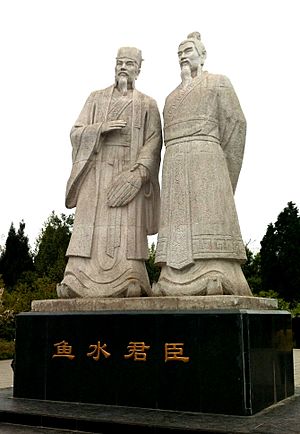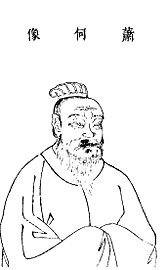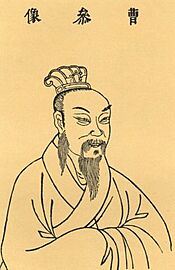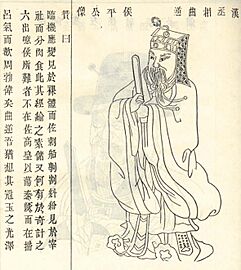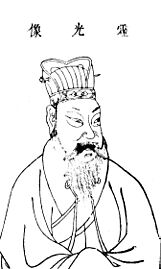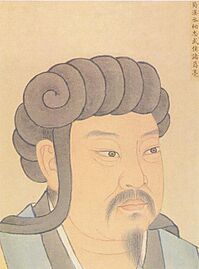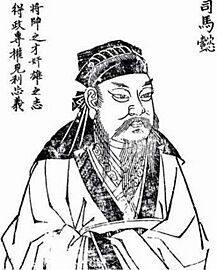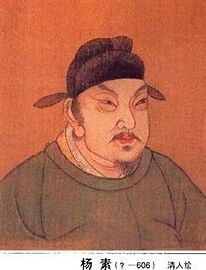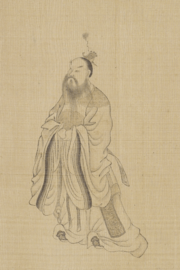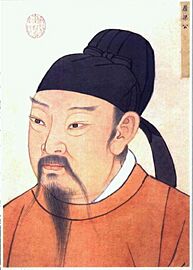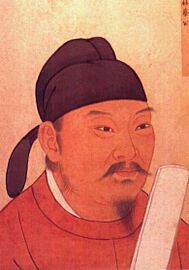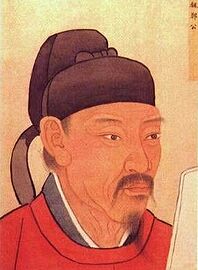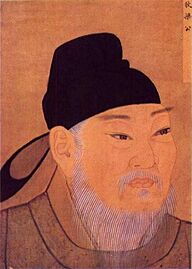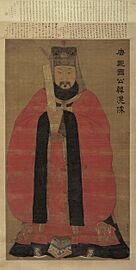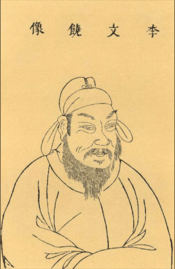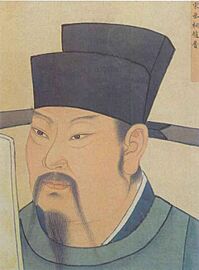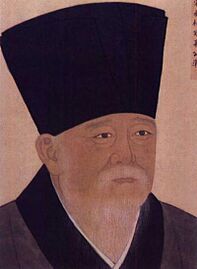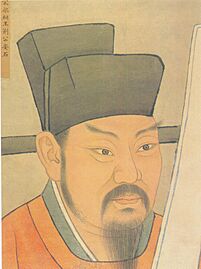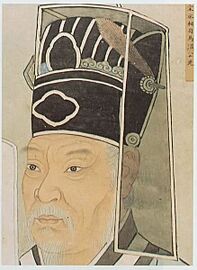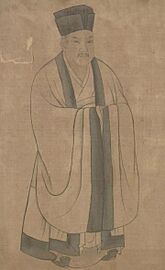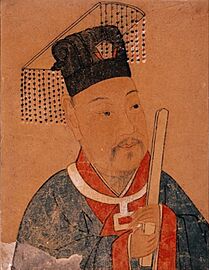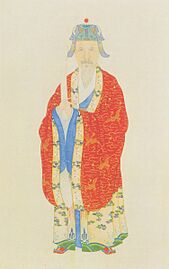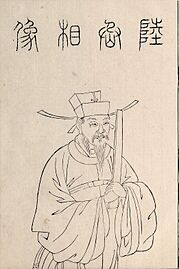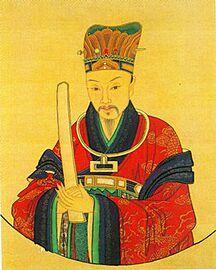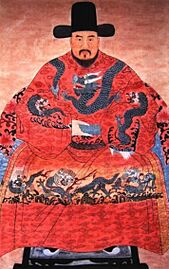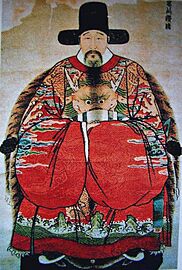Grand chancellor (China) facts for kids
Quick facts for kids Grand chancellor |
|||||||||
|---|---|---|---|---|---|---|---|---|---|
| Chinese | 宰相 | ||||||||
| Literal meaning | overseeing minister | ||||||||
|
|||||||||
| Alternative Chinese name | |||||||||
| Chinese | 丞相 | ||||||||
|
|||||||||
| Second alternative Chinese name | |||||||||
| Traditional Chinese | 相國 | ||||||||
| Simplified Chinese | 相国 | ||||||||
|
|||||||||
| Third alternative Chinese name | |||||||||
| Traditional Chinese | 宰輔 | ||||||||
| Simplified Chinese | 宰辅 | ||||||||
|
|||||||||
| Fourth alternative Chinese name | |||||||||
| Chinese | 宰衡 | ||||||||
|
|||||||||
| Fifth alternative Chinese name | |||||||||
| Traditional Chinese | 內閣總理大臣 | ||||||||
| Simplified Chinese | 内阁总理大臣 | ||||||||
|
|||||||||
In ancient China, the grand chancellor was a very important government official. You could think of them as a bit like a prime minister or chief advisor to the emperor. This person had a lot of power and helped the emperor run the country.
The grand chancellor's job was to look after all the important matters of the government. They helped make big decisions and even wrote down the emperor's orders. They were the emperor's main helper and political advisor. Sometimes, their power was almost as great as the emperor's!
This important role meant that the relationship between the grand chancellor and the emperor was key. It showed how a leader and their top helper should work together, which was a big idea in ancient Chinese thinking about government. Over time, the name and exact powers of this role changed a lot.
A Look Back: History of Chancellors
The very first chancellor in China was Guan Zhong. He became chancellor in the state of Qi in 685 BC. Later, during the Warring States period, the role of chancellor became official in the state of Qin. This person was seen as the leader of all government officials. Sometimes, there were even two chancellors, one senior and one junior.
Early Dynasties: Qin and Han
After Qin Shi Huang created the Qin dynasty (221–206 BC), the chancellor was one of the three most important officials. These three were called the Three Ducal Ministers.
During the Han dynasty, the chancellor's title changed a few times. Later, the role was replaced by three top officials. However, in 190 AD, a powerful warlord named Dong Zhuo brought back the title "Chancellor of State." He made himself more powerful than the other officials.
After Dong Zhuo died, the position was empty for a while. Then, Cao Cao brought back the "imperial chancellor" role in 208 AD. From then until 220 AD, the chancellor's power was sometimes even greater than the emperor's! This often happened when a dynasty was becoming weak.
Later Dynasties: Sui, Tang, and Song
In the Sui dynasty, the top officials from three main government departments were all called "chancellors." During the Tang dynasty, the government was split into three main departments. The head of each of these departments was usually called a chancellor.
In the Song dynasty, the chancellor's role was also known by different names. Sometimes, the top chancellor was called the "prime minister," and the second-in-command was called the "second minister."
Yuan and Ming Dynasties
During the Yuan dynasty, the chancellor was not the head of the main government office. Instead, the Crown Prince held that position.
When the Ming dynasty began, the chancellor became the head of the main government office again. But this important role was eventually removed after a chancellor named Hu Weiyong was accused of treason in 1380. Even after this, people still used the term "appointment of prime minister" for those who held the highest government jobs until 1644.
Qing Dynasty and Beyond
The Qing dynasty did not have a specific "chancellor" position. Instead, the duties were handled by different groups, like the Grand Council. Sometimes, one minister became so powerful that people would informally call them the "chancellor."
In 1911, just before the Qing government ended, they created a new position called "prime minister." But this role only lasted for less than a year before the dynasty fell.
List of Chancellors of China
Here are some of the famous chancellors from different periods in Chinese history.
Chancellors of Shang dynasty
| Name | |
|---|---|
| Pinyin (romanization) | Chinese characters |
| Yi Yin | 伊尹 |
| Zhong Hui | 仲虺 |
| Yi Zhi | 伊陟 |
| Wu Xian | 巫咸 |
| Wu Xian | 巫賢 |
| Gan Xuan | 甘盤 |
| Fu Yue | 傅說 |
| Ji Zi | 箕子 |
Zhou dynasty
- Jiang Ziya
- Duke of Zhou
- Duke Huan of Zheng
- Duke Zhuang of Zheng
- Guan Zhong of Qi state (died in 645 BC)
- Bao Shuya of Qi state
- Yan Ying of Qi state
- Fan Li of Qi State and Yue state
- Wu Zixu of Wu state
- Bo Pi of Wu state
- Cheng Dechen of Chu state
- Sunshu Ao of Chu state
- Wu Qi of Chu state
- Lord Chunshen of Chu state
- Lord Mengchang of Qi state
- Tian Dan of Qi state
- Li Kui of Wei state
- Hui Shi of Wei State
- Lin Xiangru of Zhao state
- Li Mu of Zhao state
- Su Qin of Yan state
- Yue Yi of Yan state
- Baili Xi of Qin state
- Shang Yang of Qin State
- Zhang Yi of Qin State
Qin dynasty
- Fan Ju
- Lü Buwei (251–238 BCE in office)
- Lord Changping
- Kui Zhuang
- Wang Guan
- Li Si (?–208 BCE in office)
- Feng Quji
- Zhao Gao (208–207 BCE in office)
Han dynasty
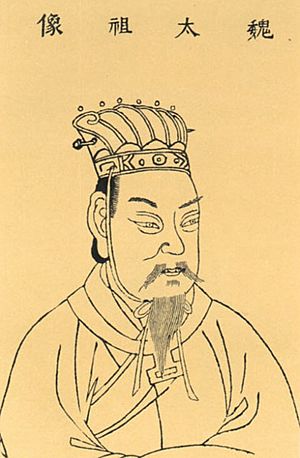
- Xiao He (206–193 BCE in office); Chen Xi (197 BCE), over Zhao
- Cao Shen (193–190 BCE in office)
- Chen Ping (190–179 BCE in office)
- Zhou Bo
- Guan Ying
- Zhou Yafu
- Huo Guang
- Shi Dan 史丹 (see Emperor Yuan of Han)
- Wang Mang
- Liu Yan (Bosheng)
- Deng Yu (25–27 in office)
- Wu Han
- Yuan An
- Dou Xian
- Li Gu
- Liang Ji
- Dou Wu
- Chen Fan
- Qiao Xuan
- Cao Song
- Zhang Wen
- Liu Yu
- Dong Zhuo
- He Jin
- Wang Yun
- Ma Midi
- Xun Shuang
- Huangfu Song
- Zhu Jun
- Cao Cao (196-220 in office)
- Cao Pi
Three Kingdoms
Eastern Wu
- Sun Shao (221–225)
- Gu Yong (225–243)
- Lu Xun (244–245)
- Bu Zhi (246–247)
- Zhu Ju (249–250)
- Sun Jun (253–256)
- Sun Chen (258)
- Puyang Xing (262–264)
- Zhang Ti (279–280)
Shu Han
- Zhuge Liang (221–234)
- Jiang Wan
- Fei Yi
- Dong Yun
- Jiang Wei
- Dong Jue
- Fan Jian
- Zhuge Zhan
Cao Wei
- Jia Xu
- Hua Xin
- Zhong Yao
- Wang Lang
- Chen Qun
- Dong Zhao
- Cui Lin
- Man Chong
- Jiang Ji
- Cao Shuang
- Sima Yi
- Gao Rou
- Wang Ling
- Zhuge Dan
- Sun Li
- Sima Shi
- Sima Zhao
- Sima Fu
- Wang Chang
- Wang Guan
- Deng Ai
- Zhong Hui
- Sima Yan
- Wang Xiang
- Sima Wang
Sui dynasty
- Gao Jiong
- Li Delin
- Su Wei
- Yang Su
- Yang Guang
- Yang Xiu
- Yang Zhao
- Yang Jian
- Xiao Cong
- Yuwen Shu
- Yu Shiji
- Li Yuan
- Yuwen Huaji
- Wang Shichong
- Li Mi
Tang dynasty
- Li Shimin (618–626 in office) (later Emperor Taizong of Tang)
- Fang Xuanling (626–648 in office)
- Wei Zheng (629–643 in office)
- Cen Wenben (unknown, under Emperor Taizong of Tang)
- Cen Changqian (unknown, under Emperor Gaozong of Tang)
- Cen Xi (unknown, under Emperor Shang of Tang, Emperor Ruizong of Tang and Emperor Xuanzong of Tang)
- Fan Lübing (686–688 in office)
- Di Renjie (691–693, 697–700 in office)
- Yao Chong (698–705, 710–711, 713–716 in office)
- Zhang Jiuling (733–736 in office)
- Li Linfu (734–752 in office)
- Yang Guozhong (752–756 in office)
- Wang Wei (758–759 in office)
- Li Deyu (833–835, 840–846 in office)
Song dynasty
Northern Song
- Fan Zhi (960–964 in office)
- Zhao Pu (964–973, 981–983, 988–992 in office)
- Kou Zhun (1004–1006, 1017–1021 in office)
- Wang Qinruo (1017–1019, 1023–1024 in office)
- Wang Zeng (1022–1029, 1035–1037 in office)
- Fan Zhongyan (1040–1045 in office)
- Wang Anshi (1067-1075, 1076–1077 in office)
- Sima Guang (1085–1086 in office)
- Fan Chunren (1086– in office)
- Fan Chunli (– in office)
- Zhang Dun (1094–1100 in office)
- Cai Jing (1101–1125 in office)
Southern Song
- Li Gang (1127 in office)
- Zhang Jun (1135–1137 in office)
- Qin Hui (1131–1132, 1137–1155 in office)
- Han Tuozhou (1194–1207 in office)
- Shi Miyuan/Shih Mi-yüan (1207–1233 in office).
- Jia Sidao (1259–1275 in office)
- Chen Yizhong (1275–1276 in office)
- Wen Tianxiang (1275–1278 in office)
- Lu Xiufu (1278–1279 in office)
Ming dynasty
After the death of Hu Weiyong, the title of grand chancellor was removed. The Grand Secretariat then took over many of the chancellor's duties.
- Li Shanchang (1368–1376)
- Hu Weiyong (1376–1380) – The last official chancellor of China
- Yang Siqi
- Yan Song (in office 1544–1545)
- Xia Yan (in office 1546–1547)
- Yan Song (2nd time in office 1548–1562)
- Xu Jie
- Gao Gong
- Zhang Juzheng (in office 1572–1582)
- Zhang Siwei
- Shen Shixing
- Wang Jiabing
- Zhao Zhigao
- Wang Xijue
- Zhao Zhigao
Qing dynasty
The Qing dynasty did not have a specific "chancellor" position. Instead, the jobs usually done by a chancellor were given to other groups, like the Grand Council. Sometimes, one minister became so powerful that people would call them the "chancellor" in a general way.
In 1911, the Qing government made some changes and created the position of prime minister. This job existed for less than a year before the Qing government was overthrown.
Premiers after 1911
Images for kids
-
Xiao He, chancellor of the Han dynasty
-
Huo Guang, chancellor of the Han dynasty
-
Zhuge Liang (181–234), chancellor of the Shu Han (221–234)
-
Yang Su, chancellor of the Sui dynasty
-
Zhangsun Wuji, chancellor of the Tang dynasty
-
Han Huang (723–787), Song dynasty painting
-
Zhao Pu, chancellor of the Song dynasty (964–973, 981–983, 988–992)
-
Wang Anshi, chancellor of the Song dynasty (1067–1075, 1076–1077)
-
Sima Guang, chancellor of the Song dynasty (1085–1086)
-
Wen Tianxiang chancellor of the Song dynasty (1275–1278)
-
Yan Song, Grand Secretary of the Ming dynasty
-
Gao Gong, Grand Secretary of the Ming dynasty
See also
- Chancellor of the Tang dynasty
- Prime Minister of the Imperial Cabinet
- Menxia Sheng
- List of premiers of China
- Imperial examination
- Chinese law
- Shumishi


